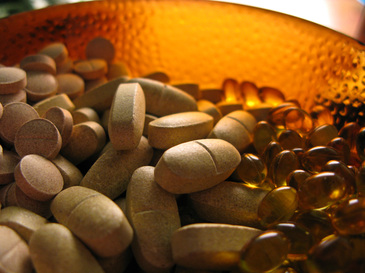|
By Micaela Stevenson
Vitamins and minerals perform hundreds of roles to keep your body functioning. However, your body cannot produce the vitamins and minerals that it needs. Vitamins are organic substances (i.e. made by plants or animals), while minerals are inorganic elements in the soil and water, which are absorbed by plants or eaten by animals. So, your diet plays an important role in ensuring that you ingest your daily requirements of these crucial vitamins and minerals. However, it is no secret these days, many people are turning to multivitamins as a source of these vitamins and minerals, and believe that it the key to a healthy lifestyle. Companies even produce and sell different multivitamins targeted specifically at young women and young men. But in order to make wise choices, it is important to stop and ask if we actually need all these multivitamins.
According to the Center for Disease Control and Prevention, in the 2003-2006 period, about 40% of Americans reported taking multivitamins/multiminerals. Many hoped to prevent heart disease and cancer. While some studies report that multivitamin use is not associated with long-term risk of cardiovascular disease [1], many report that there is limited or no significant effect [2]. One meta-analysis [3], which looked at 26 studies conducted during the 2005-2013 period, found that taking multivitamins and supplements has only limited beneficial effect on preventing cardiovascular disease or cancer. Additionally, in another study [4], done over a 25-year period with women who took multivitamins, there was a suggested association with increased total mortality risk, especially with iron.
While the scientific jury may still be out over the subject, multivitamins are useful for if people have deficiencies due to malabsorption issues. Taking a supplement of folic acid during pregnancy is also crucial for preventing neural tube defects. But the thing is, multivitamins are called “dietary supplements” for a reason. When possible, the best option is consuming food that is naturally rich in vitamins and minerals. Anyone who consumes any type of meat daily will receive most of the iron they need to have in their diets. Need more Potassium? Have a banana! Low on Vitamin C? Eat an orange! The thing to remember is that some vitamins (C and the B-complex vitamins) are water-soluble. Once your body has absorbed its daily intake, the excess will simply be flushed out of your body. So having lots of orange juice as well as a multivitamin with heaps of vitamin C daily becomes redundant. In contrast to water-soluble vitamins, when excess amounts are excreted, fat-soluble vitamins, such as A, D, E, and K, can be stored in your body. So having lots of fat-soluble vitamins that exceed your daily intake can potentially lead to a vitamin overdose. For example, according to Mayo Clinic, having too much Vitamin A stored away can cause swelling of the brain and skin loss. Of course, these are the extremes. Other (less extreme) side effects include dizziness and fatigue. However, it is impossible to know how each person’s body will respond and it is better to ensure that each person is only taking his or her allotment of Vitamin A that is safe. Another example are risk factors associated with an excess of iron in one’s diet. For women, due to menstruation, each of us is able to consume more iron than most men, but there are risk factors for overdosing on iron. According to Mayo Clinic , these side effects can include aches, cramping, and swelling of mouth and throat. However uncommon these are or even if they must occur over a long period of time, these are still prevalent health concerns. At the end of the day, if you aren’t getting access to a well-balanced diet, or if you have deficiencies due to malabsorption problems, then multivitamins can provide your required daily dose of essential nutrients. However, merely taking them as a precaution to make sure you are leading a healthy lifestyle is probably not a good idea. If you are feeling a bit under-the-weather and think you may need a vitamin or mineral boost, then first address your diet. You can check out the recommended daily intake for some key vitamins and minerals here, and learn which foods can provide these requirements here. If this doesn’t work, then it is best to only take specific vitamins or minerals that you may be deficient in. The take home message is to treat your multivitamins like a medication you’re thinking of starting: talk to your doctor first and see if they are really necessary. You may end up not needing them and saving yourself a lot of money! ---------------------- Studies Cited: 1. Rautiainen S, Lee I, Rist, PM, Gaziano, JM, Manson JE, Buring JE, Sesso HD. Multivitamin use and cardiovascular disease in a prospective study of women. Am J Clin Nutr 20015; 101(1):144-152. 2. Efficacy of multivitamin/mineral supplementation to reduce chronic disease risk: a critical review of the evidence from observational studies and randomized controlled trials. Crit Rev Food Sci Nutr 2015; 55(14). 3. Fortmann SP, Burda BU, Senger CA, Lin JS, Whitlock EP. Vitamin and mineral supplements in the primary prevention of cardiovascular disease and cancer: An updated systematic evidence review for the U.S. Preventive Services Task Force. Ann Intern Med. 2013; 159(12):824-34. 4. Mursu J, Robien K, Harnack LJ, Park K, Jacobs DR. Dietary supplements and mortality rate in older women: the Iowa Women’s Health Study. Arch Intern Med. 2011; 171(18):1625-1633. About the Author
Micaela Stevenson is a student at Eastern Michigan University majoring in Biology and minoring in Women’s studies, health and illnesses, psychology, and chemistry. She loves Science and is passionate about reading and writing. She is a Girl Up organization leader, a Daisy Troop Leader, a Scientista leader, as well as the founder and president of a health based organization called My Health. She is in the premed club and volunteers for Neonatal Intensive Care Unit at a local hospital, as she hopes to attend the Johns Hopkins School of Medicine and become a pediatric neurosurgeon, once she graduates from her current degree. In her free time she bakes, goes to Karaoke bars, eats sushi and ice cream, and plays Farmville!
Comments? Leave them below!
0 Comments
Your comment will be posted after it is approved.
Leave a Reply. |
LIFESTYLE BLOGRead our lifestyle advice, written exclusively for pre-professional women in science and engineering. From advice about fashion, work and family balance, self, wellness, and money, we've got you covered! |
The Scientista Foundation, Inc. All Rights Reserved © 2011-2021 | Based in NY | [email protected]
The Network for Pre-Professional Women in Science and Engineering
The Scientista Foundation is a registered 501(c)(3) -- Donate!
The Network for Pre-Professional Women in Science and Engineering
The Scientista Foundation is a registered 501(c)(3) -- Donate!

